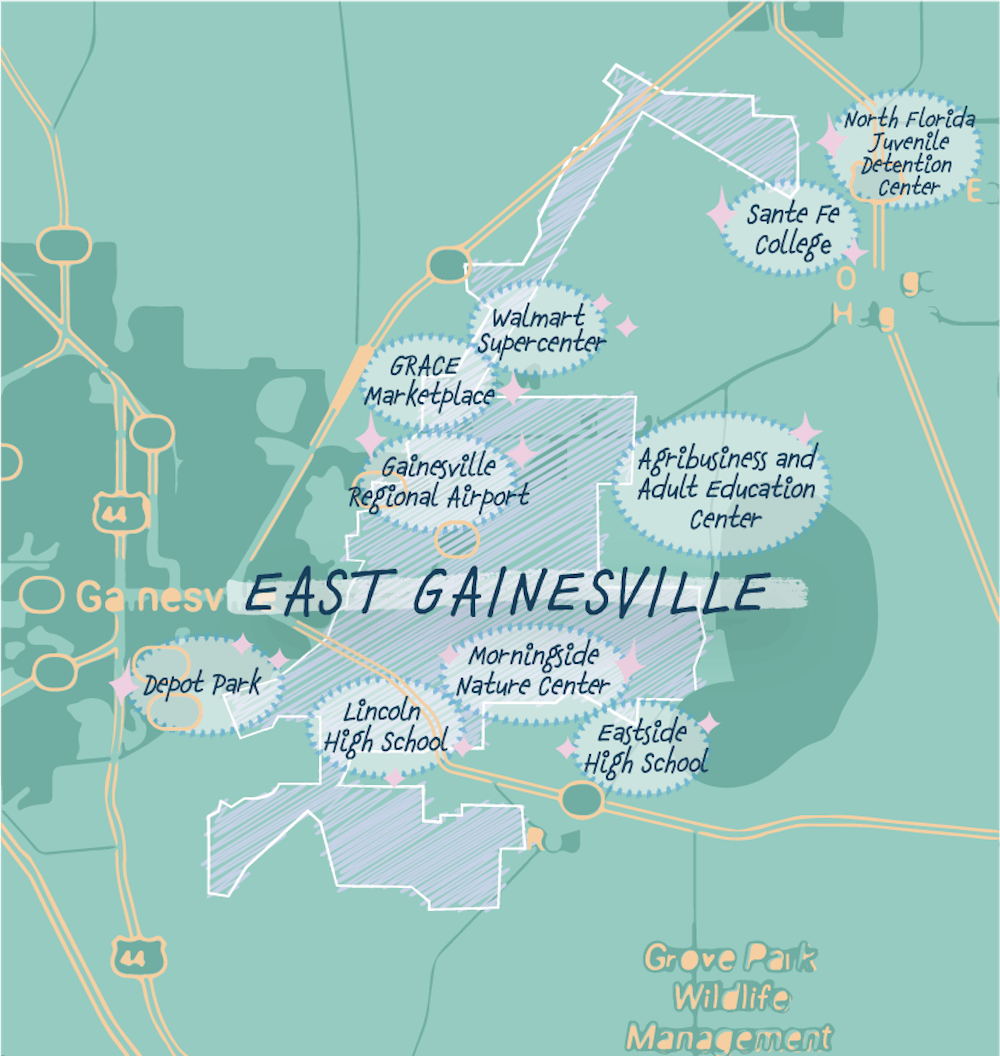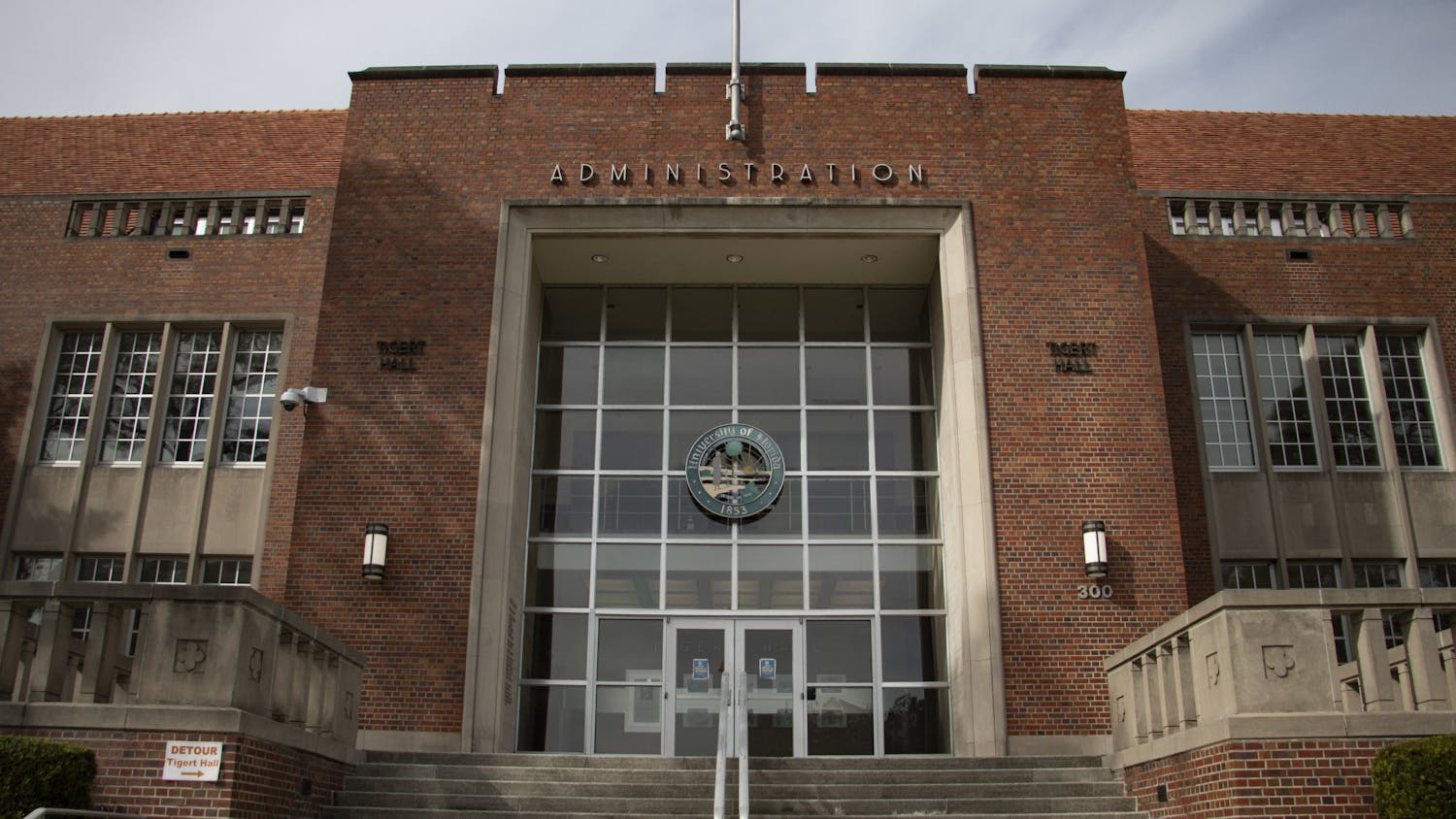Some East Gainesville residents may no longer have to travel across the city to shop at a grocery store thanks to a newly approved city initiative.
On Thursday, Commissioner Gail Johnson, policy experts and community activists proposed a plan for the city to look into creating a community grocery store in East Gainesville, where several neighborhoods qualify as food deserts. The commission unanimously passed the plan.
“It's time for us to fully commit to economic development on the east side of town after years and years of stonewalling and saying no,” Johnson said.
The USDA defines a food desert as a low-income area where a substantial number of residents have low access to a supermarket or large grocery store. In Gainesville, there are 11 census blocks that have more than a majority of its households without a vehicle, yet residents are located more than a half mile from a supermarket, a report from the county showed. East of Southwest Sixth Street, the only USDA-approved grocery stores are a Publix, a Walmart and a Winn Dixie.

Screenshot of the USDA Food Access Research Atlas of the 11 census tracts that are considered food deserts in Gainesville. The legend and color coding was done by Erika Clesi. [Courtesy of Erika Clesi]
The new proposal will prompt GRACE Grows, a community garden organization targeting homelessness, to move forward with a community engagement project to gauge resident opinion on the ideal location and model for the grocery store.
If the project continues to garner support and moves forward, it is expected to take about two to three years to complete, Johnson said.
The plan passed unanimously with Commissioner Harvey Ward absent during the vote. Commissioner Adrian Hayes-Santos voted against a part of the proposal that would prompt city consideration of $3 to $5 million funding for the community grocery store.
Johnson said she got the funding estimate from the Evans Center, a similar community store in Palm Bay, Florida, which cost about $3.5 million to create. But Hayes-Santos expressed concerns over committing to using that amount of money before the city considers more details.
“As far as budgeting a certain amount at this time — I’m not ready to do that,” Hayes-Santos said. “We need to figure out what model we’re going to use and budget accordingly.”
There aren’t many existing models to help the city decide what is best for East Gainesville, Mayor Lauren Poe said. One community grocery store in Baldwin, Florida, is government-owned. Another in Chicago, Illinois resides in a public housing complex and created jobs for local residents.
“I’m cautiously enthusiastic,” Poe said. “Because of the talent we have directly involved with the local food system, I have a high degree of confidence that we can figure it out.”
Erika Clesi, a policy fellow with the Office of the City Clerk, said the limited grocery options in East Gainesville indicate a lack of access to affordable and nutritious food in those areas.
The city’s food insecurity rate was close to 14% in 2018 but rose to almost 17% in 2020 due to problems posed by the COVID-19 pandemic, according to Clesi’s policy research.
The proposal will also have city staff conduct an economic leakage study, which will look into spending outside of East Gainesville that drains wealth from the area.
Commissioner Hayes-Santos pointed to how much of the issue with food insecurity in Gainesville has to do with zoning that prevents grocery stores from being built in certain areas
An item was added to the proposal to look into zoning issues before it was approved.
Commissioner Gigi Simmons said there are deeper, psychological impacts of not having access to a grocery store. She encouraged Johnson and the policy team to speak with a sociologist to get more insight.
During public comment, a handful of residents expressed their support for the grocery store. One resident likened food deserts to “food apartheid,” saying the issue is rooted in racial disparities.
Currently, the city is developing a master food security plan with several initiatives like mobile farm stands and increasing support for the City’s Community Garden program. The grocery store proposal was added to the growing list of efforts.
Commissioners argued over which of their initiatives should take priority during this fiscal year and decided that there should be a mix of long-term and short-term solutions.They agreed county support is essential to the completion of these projects.
Civic Collaboration Specialist Karissa Raskin, who builds city-community partnerships, said she would need extra staff to work on so many different projects. However, she said some of these initiatives may go hand-in-hand to develop a sustainable community-driven model for a grocery store.
“I think the opportunity to take the knowledge that we’re gaining from one project and building it into the planning stages of the other — to me, they’re linked,” Raskin said.
Contact Alan Halaly at ahalaly@alligator.org. Follow him on Twitter @AlanHalaly.

Alan Halaly is a third-year journalism major and the Spring 2023 Editor-in-Chief of The Alligator. He's previously served as Engagement Managing Editor, Metro Editor and Photo Editor. Alan has also held internships with the Miami New Times and The Daily Beast, and spent his first two semesters in college on The Alligator’s Metro desk covering city and county affairs.






